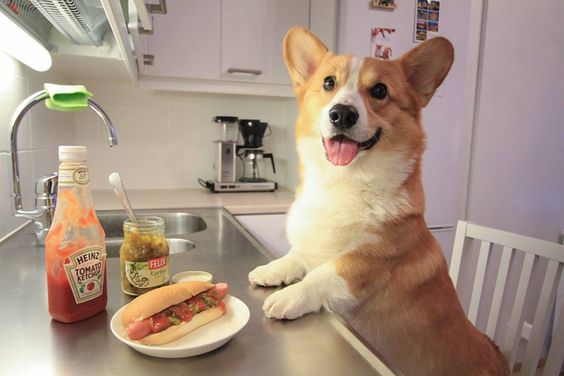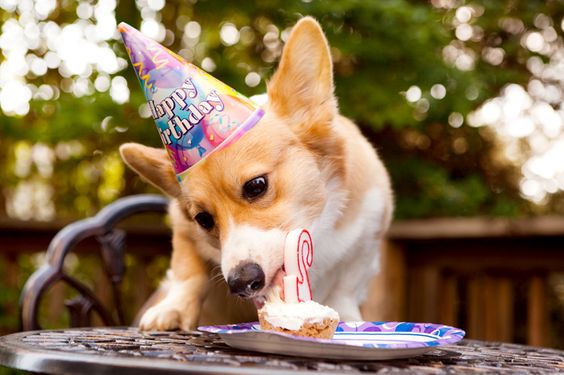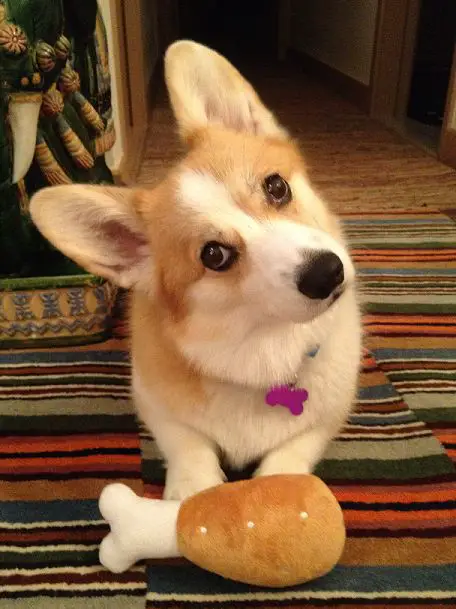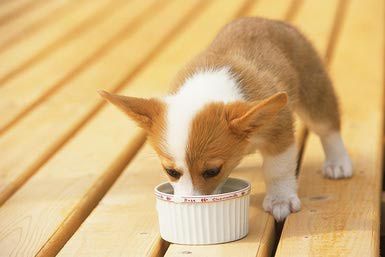If you’ve already decided on a dog breed and opted for a corgi, then it’s time to figure out how to feed your pet. Corgis are not particularly large in size, but this is a very active and cheerful dog that will become your companion for a long time. If you decide to get this breed, then be prepared for the fact that a sea of optimism and energy will pour out on you every day.
Feeding Your Corgi

Corgi is a breed that belongs to the shepherd family (although you can’t tell from their appearance) and has good health and immunity. If you stick to the right diet, then the Welsh Corgi can live quite a long period of time. Despite all the advantages of this breed, they have a minor feature – a tendency to obesity. This is why you should carefully choose what to feed your dog.
To raise a healthy and active dog, you need to follow several recommendations regarding their nutrition:
- Corgis have a great appetite and are prone to overeating, so you need to feed them a small amount of food at a specific time. If the dog hasn’t finished eating its portion, remove the bowl until the next meal. Even if your pet wants to continue eating, you should not follow his lead, later this will negatively affect his health: back problems may begin.
- Do not forget about water for your pet: it should always be freely available for the dog. Avoid overly bulky bowls as corgis consume little water. Bowls with a volume of 200-250 milliliters are great.
- Once a month, you need to arrange fasting days for the corgi. This usually happens in the summer, when the animal’s appetite dulls due to the heat.
- It is unacceptable to mix natural food and dry food for corgi nutrition. Natural and drying have different digestion times. Because of this, the dog may have problems with the digestive tract and bowel movements.
- It is advisable to feed the dog with the food that the breeder will recommend to you. This will help soften the adaptation of the dog in the new home and will not lead to various gastrointestinal disorders.
- All fatty foods should be excluded from the dog’s diet, as they negatively affect the health of the corgi.
- Corgis need to be fed after walking or exercising. If your dog eats prior to exercise, digestive and stomach problems may occur.
Feeding a Corgi Puppy
Up to two months, the corgi feeds exclusively on the milk of its mother. If the female refuses to feed her puppy, you need to buy a mixture of powdered milk and give it to him. These mixtures are found in many feed brands.
It is important to remember that the food for the puppy must be balanced and fortified. Watch your pet so as not to miss the moment when he gains weight above normal. If this happens, you need to transfer the pet to a lightweight diet. Corgi cannot be eaten from a human table; the dog must be taught this from childhood.
Natural raw meat (deep-frozen, finely chopped) should make up about two-thirds of the diet. It is better to give it in the evening. Of course, high-quality dry food of the premium or super-premium category is also suitable for the dog, without any special additives.
Sometimes you can give:
- low-fat broth;
- fruit
- vegetables (beets, carrots, tomatoes, zucchini, salad);
- boiled fish (after 4 months);
- cereals (buckwheat, rice);
- dairy products (milk, cottage cheese, kefir).
Chicken is contraindicated, with the exception of raw chicken eggs.
Stick to the following rules:
- food – strictly according to age;
- infrequent feed change;
- do not mix dry food and regular food;
- do not give food during breaks. When teaching teams, cheese, low-fat dog biscuits are suitable.
The Number of Meals a Corgi Puppy Has to Eat

Corgi age Number of feedings per day
2-4 months 5
4-6 months 4
6-8 months 3
Older than 8 months 2
Corgi puppies need to be fed more often than adults (they reach this status after eight months). As they grow up, dogs need to get as many nutrients as possible to influence their growth and development. Your dog’s appearance and health are highly dependent on nutrition, especially in the initial stages.
The puppy refuses to eat: a step-by-step way out of the situation
Corgis are food dogs. A healthy corgi will never refuse the food you offered him. The reasons for refusing food can be completely different:
- stress;
- spoiled food;
- poor quality food;
- stale water;
- unsuitable dishes;
- change of feeding place;
- mature age of the corgi;
- moving to a new location;
- constant feeding the dog only liquid food.
Try not to get angry or yell at your pet for refusing food. Corgis can remember the negative emotions of their owner and subsequently, this will negatively affect feeding.
If your dog refuses food for a long time, has ceased to be active and cheerful, then this is a reason to take him to the veterinarian: perhaps the dog is sick.
Adult Corgi Food

Once your baby is two months old, it can be switched from milk to regular food. It can be of two types – natural food and dry food. Each type of food has its own advantages and disadvantages.
Natural food for Corgi
Often, the owners of corgi prefer natural food, as they doubt that dry food can provide a sufficient amount of vitamins, trace elements, and nutrients. But a straight line for a corgi should not be on the master’s table. If you decide to feed your dog natural food, then you need to take care of finding quality products, preparing fresh portions every day, and also do not forget about additional vitamin supplements that are in food, but not in natural food.
Owners who refuse dry food due to its lack of usefulness often feed corgi incorrectly. It is necessary to properly take into account all the components of the diet, correctly calculate the composition, and select combinations of certain ingredients. Improper feeding leads to obesity, rickets, digestive problems, constipation and diarrhea, dandruff, and other problems. The list is endless.
Remember a few rules for feeding corgi natural food:
- Meat should make up 60-70% of the diet. Best fed with lean meat or raw liver. If your corgi lives in a country house, constantly runs and plays, give your baby animal squirrels. Their content is highest in meat and fish: beef, lamb, horse meat, veal, sea bass. To avoid infection with harmful microorganisms and parasites, you need to boil the food or dip it in boiling water for a couple of minutes.
- It is necessary to give fermented milk products (cottage cheese, kefir, fermented baked milk). As for cottage cheese, it can be given every day while the puppy is growing, as it contains a lot of calcium and strengthens the bones of dogs.
- Buckwheat and rice porridge can be given to the dog: this will improve digestion and promote better bowel movements.
- It is important to feed your dog raw vegetables and fruits. Before that, they need to be finely chopped.
The number of products should be calculated as follows:
- meat – 20 grams per kilogram of weight, cottage cheese – 30 grams. After seven months, you can give either meat or cottage cheese to choose from.
- Kefir, yogurt, yogurt – 50-100 grams per day.
- A few vegetables and fruits.
- Porridge – from ¼ to three glasses; the volume depends on the age and weight of the pet.
- Sunflower oil – no more than a tablespoon per day.
- If we take the average version, then the corgi should consume approximately 35% of proteins, 40% of carbohydrates, and 25% of fats per day.
What You can’t Feed a Welsh Corgi
- bones, especially chicken and boiled;
- raw river fish;
- chocolate and other sweets;
- fresh meat;
- raw river fish;
- condiments, spices, salt;
fatty, fried, smoked - pork;
- waste from the table;
- spoiled and low-quality products;
- food containing dyes and preservatives.
Dry Food for Corgi

This type of food is much more convenient for any owner. The advantages include the fact that the food is already saturated with useful vitamins and minerals that correspond to the age and physique of the pet. The host does not need to spend time preparing food, just pouring food into a bowl is enough.
The selection of food must be approached with special care and it is advisable to consult a veterinarian. Corgis eat exclusively premium food. But do not rush to be upset about monetary losses: if you feed your dog with cheap food, then it will not receive enough nutrients.
Also, the convenience of dry food lies in the fact that it is always written on the packs how much food the dog needs. Babies up to three months old need to be soaked in food until they learn to eat on their own. In adult dogs, the amount of feed is determined by weight, activity, and the presence of any disease.
Several recommendations when choosing dry food:
- Focus on the weight and activity of your pet.
- See who the food is made for (adult dog or puppy). Puppy food is much more nutritious, contains more protein, phosphorus, calcium, and other elements necessary for growth. An adult dog has already stopped growing and therefore it is important for the owner to maintain optimal body weight and contribute to the normal functioning of the body.
- Keep track of the expiration date.
- Eliminate additional vitamin supplements from the diet, as they are already present in the feed.
Feeding Lactating Female Dogs
Before mating, the dog must eat much more densely than usual. You also need to increase the amount of protein in the diet. During the period when the female dog acquires puppies, she should eat almost as much as before, but with the increase in the weight of the puppies – increase the portion of food.
If your corgi eats dry food, then you do not need to include anything else in the diet. Many producers have special food for lactating female dogs.
Elderly Corgi Diet
A dog becomes elderly when it has lived two-thirds of its total life span. Corgi enters old age when it reaches 5-6 years old. In his body, the metabolism gradually slows down and the dog spends less energy than at a young age.
Therefore, the diet should be less high-calorie, and you also need to reduce the percentage of fats and proteins.
It is considered acceptable to replace some of the meat with lean fish or dairy products. Older corgi can be constipated, so they need to be given dietary fiber to make it easier to have a bowel movement.
The daily diet of an elderly corgi is calculated based on the following proportions:
meat, fish, dairy products – 40-50%;
porridge – 30-40%;
vegetables, fruits, herbs – 10-20%.
If you are feeding your pet dry food, then you can buy the “for senior dogs” line. Typically, these foods cater to all the needs of your aging pet.
How to determine the excess weight in a corgi. Why overeating is harmful.
Dogs do not have a specific index that calculates the optimal body weight, since all breeds are very different from each other. Obesity in dogs is considered to be such a weight that exceeds the figure indicated in the breed standard (and for the corgi this figure is 13 kilograms) by 40%.
In this condition, the dog has an excess of body fat associated with metabolic disorders. Subsequently, it can lead to the development of a number of diseases.
For example, the fat that is deposited on the inner wall of the sternum interferes with the normal movement of air in this area, which results in serious respiratory diseases.
If we talk about common colds, then they are much more severe for obese animals than for other individuals.
You do not need to treat this problem with a smile and be touched by the next gained pounds of your dog – this can lead to serious health problems.
What Makes a Dog Fat

- Most often, the deviation is associated with low physical activity. Sometimes the owners are too lazy to take a walk with their dog.
- Excessive caloric intake of food that the dog receives. If the corgi consumes more calories than it spends, it will lead to obesity.
- If you feed a dog from a human table, then the gained kilograms are inevitable.
It is necessary to calculate the diet of the dog depending on its physical activity and the degree of activity. Otherwise, the food will simply not be absorbed in the animal’s body.
You have not just bought a beautiful and cute puppy, but you have assumed responsibility, which must be borne to the last. In planning a diet, there are no unimportant little things – everything matters and leaves an imprint on the general condition of the pet.
Compliance with all recommendations will help to avoid health problems and raise an active dog. In your hands is not a means of entertainment, but a whole life.

